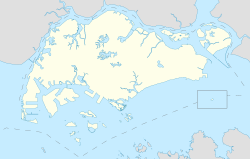
Geylang is a planning area and township located on the eastern fringe of the Central Region of Singapore, bordering Hougang and Toa Payoh in the north, Marine Parade in the south, Bedok in the east, and Kallang in the west.
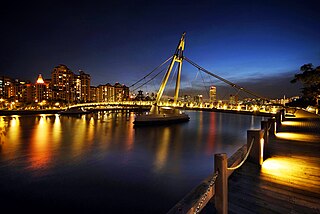
Kallang is a planning area and residential zone located in the Central Region of Singapore.
Kembangan is a subzone and residential precinct located in the town of Bedok in the East Region of Singapore. It consists largely of private residential areas and a small public housing estate along Lengkong Tiga.

MacPherson is a neighbourhood located within the district of Geylang in the Central Region of Singapore. Its location roughly corresponds to the identically titled subzone in the Geylang Planning Area and is approximately sandwiched between the neighbourhoods of Aljunied and Paya Lebar. MacPherson largely consists of various public housing estates centered on Circuit Road and an industrial area. The Pelton Canal runs through the neighbourhood, which separates a private housing estate off MacPherson Road, and the public housing estate along Circuit Road.
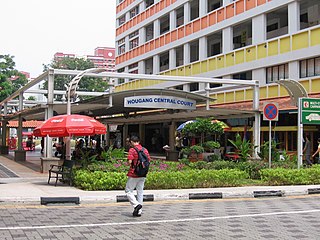
Hougang is a planning area and mature residential town located in the North-East Region of Singapore. It is the largest housing estate in Singapore based on land area, and is home to 247,528 residents as of 2018. Hougang planning area is bordered by Sengkang to the north, Geylang to the south, Bedok to the southeast, Toa Payoh to the southwest, Serangoon to the west and Paya Lebar to the east.

The National Solidarity Party is an opposition political party in Singapore.

Bedok is a planning area and residential town located in the geographical region of Tanah Merah along the south-eastern coast of the East Region of Singapore. Bedok is bounded by five other planning areas: Paya Lebar to the north, Hougang to the northwest, Tampines to the northeast and east, Geylang to the west and Marine Parade to the southwest. It also shares a maritime boundary with the Singapore Strait to the south and southeast.
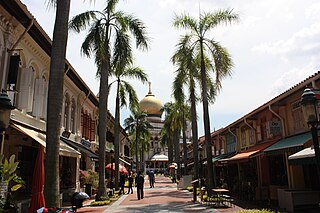
Kampong Glam is a neighbourhood and ethnic enclave in Singapore. It is located north of the Singapore River, in the planning area of Rochor, known as the Malay-Muslim quarter.
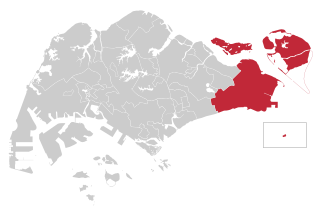
The East Coast Group Representation Constituency is a five-member Group Representation Constituency in the eastern area of Singapore. The areas of the Group Representation Constituency consists of locations such as East Coast Park, Bedok, Changi, Simei, Siglap, Tampines, Pasir Ris, Chai Chee, Changi Airport. The GRC also covers a large portion of Singapore's eastern territorial waters. The five divisions: Bedok, Siglap, Fengshan, Changi-Simei and Kampong Chai Chee managed by East Coast Town Council. The current MPs are from the People's Action Party (PAP) Heng Swee Keat, Jessica Tan, Cheryl Chan, Tan Kiat How and Maliki Osman.

The MacPherson Single Member Constituency is a single member constituency located in the central area of Singapore. It is managed by Marine Parade Town Council. The current Member of Parliament for the constituency is People's Action Party (PAP) Tin Pei Ling.

Commonwealth is a subzone of Queenstown, located in the central-western part of Singapore. It is named after the Commonwealth of Nations. Commonwealth consists of Housing and Development Board flats, and there is one primary school and a secondary school in the area, New Town Primary School and Queensway Secondary School. SBS Transit Bus Services 32, 51, 93, 100, 105, 111, 122, 123, 145, 147, 153, 186, 195, 196, 198, SMRT Buses Services 61, 961/961M & 970 and Tower Transit Singapore Service 855 passes through this area. The nearest Mass Rapid Transit station is Commonwealth MRT station. Amenities in the area include Blessed Sacrament Church, Faith Methodist Church, Masjid Mujahidin Mosque, Queenstown Community Centre, Queenstown Lutheran Church, Ridout Tea Garden, Shuang Long Shan Wu Shu Ancestral Hall, Sri Muneeswaran Temple and Tanglin Halt Food Centre and Market.
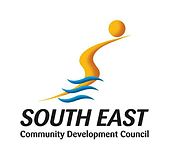
The South East Community Development Council is one of five Community Development Councils (CDCs) set up across the Republic of Singapore to aid in local administration of governmental policies and schemes. They are funded in part by the government although they are free to engage in fund-raising activities.
Moulmein–Kallang Group Representation Constituency was a four-member Group Representation Constituency (GRC), comprising several city suburbs surrounding the Central Area of Singapore as well as a sizeable portion of the Central Business District. It existed from 2011 to 2015.
Kampong Glam Single Member Constituency was a single member constituency (SMC) in Kampong Glam, Singapore. It existed as Kampong Glam Constituency from 1959 to 1988 then it was renamed as Kampong Glam Single Member Constituency during political reform in 1988. Once a small constituency with no more than ca. 9,000 registered voters, Kampong Glam constituency voters rose immediately in 1976 with at least 16,000 voters turned out to polling places. The numbers never went down ever since.

Ulu Bedok Constituency was a constituency in Singapore that existed from 1955 to 1959.

General elections were held in Singapore on Friday, 11 September 2015 to elect 89 members of Parliament. The outgoing Parliament had been dissolved and the general election called by President Tony Tan on 25 August, on the advice of Prime Minister Lee Hsien Loong. The elections were for the 13th Parliament since independence in 1965, using the first-past-the-post electoral system.

Jalan Kubor Cemetery, sometimes called Victoria Street Cemetery, is a historical royal Muslim cemetery located at Victoria Street, near Kampong Glam neighbourhood in Singapore. It is one of the oldest Muslim cemeteries in Singapore and houses many graves of important Muslim figures from the 19th and 20th centuries. The cemetery features tombstones with inscriptions in a diversity of languages and writing systems, reflecting the indigenous peoples of Singapore, including Malay, Javanese script, Buginese Lontara script, Arabic, English, Mandarin and Gujarati.
Geylang East Public Library is one of the 26 public libraries established by the National Library Board of Singapore.
